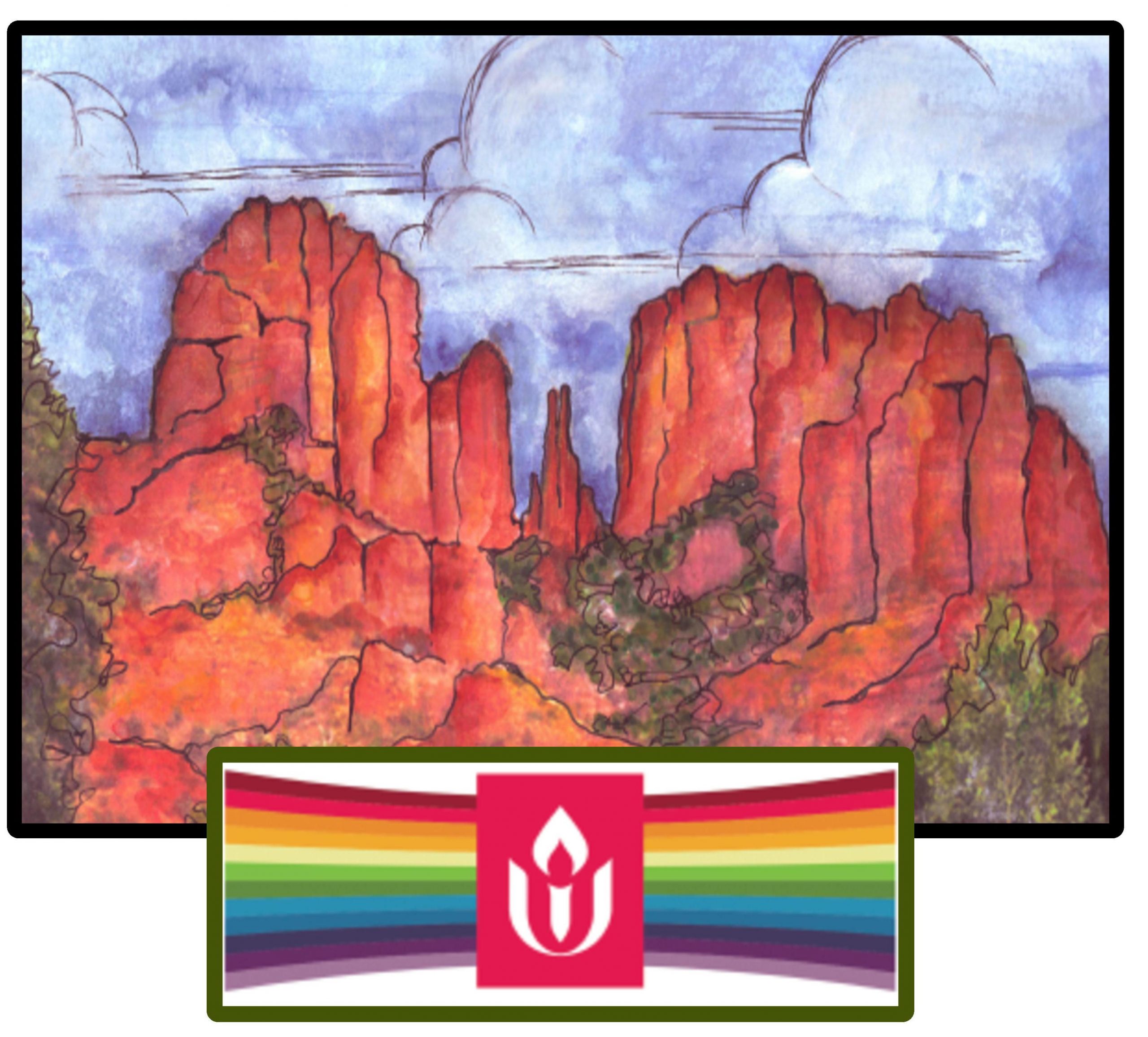[excerpt from the sermon for Sunday, Feb 13, 2022]
Good morning and welcome to the Sedona Unitarian Universalist Fellowship.
I welcome you in the name of the Ancestors, on whose shoulders I stand, and I welcome you in the name of all that is holy and sacred for you. It is indeed an honor and a pleasure to be able to share this space with you on this beautiful morning. My personal appreciation for the principles of Unitarian Universalism are best summed up in the welcoming words adapted from the Unitarian Church of Dublin, Ireland:
“We do not ask what you believe, or expect you to think the way we do, but only that you try to live a kindly, helpful life, with the dignity proper to a human being. Welcome, all who believe that religion is wider than any sect and deeper than any set of opinions; welcome all who might find in our friendship, strength, and encouragement for daily living.”
Today’s sermon is entitled “Awakening.” What is an awakening?
Might it be reading a few words from a wisdom source, like the Buddha, who said, “thousands of candles can be lighted from a single candle, and the life of the candle will not be shortened. Happiness never decreases by being shared.”
An awakening has been described a revival of interest or attention, a recognition, a realization, or a coming into awareness of something, especially in a community. Are we, as individuals and as a society, in an awakening now?
Speaking of the times we live in now, “What3Words” is a type of GPS that has divided the world, the earth, into fifty-seven trillion 10-foot squares, then each square has been assigned a 3-word name. Users look at satellite maps for your location, pull up a three-word code and voila… “What3Words” will direct your car to that exact spot, address or not.
My favorite example of our present time is the story of one nineteen-year-old Jack Sweeney. Jack recently received a check for five-thousand dollars from non-other than Elon Musk.
Mr. Musk was asking Jack to please stop and take down his twitter account that tracks and displays the movements of his private jet. Young Jack also tracks the private jet flight plans and location of the planes of Bill Gates and Jeff Bezos. No offers from them yet.
So, what say we try for a little awakening right here right now?
What if we recognized our expectations as yet to be realized resentments?
Might this be an awakening for you? For us, right now, in this moment?
What if your expectations were your yet-to-be-realized resentments? That is, what you expect turns out to be a waiting resentment and what if you knew that to be so? Would you be opened to letting your expectations go?
And, while we are at it, what if we lowered our expectations for ourselves, for our mates, for our colleagues, and for our fellowship? Not our respect, not our commitment, and not our honor.
Just our expectations, our unrealized resentments?
The Buddha gave us some insight, when he said, in fact, “expectation is the source of suffering.”
I can see them now, our expectations, hanging around in our minds like hustlers under a street light. Throwing dice, playing Texas Hold ’em, and just waiting to turn our expectations into resentments.
We can’t talk about awakening and being awake, and not talk about “woke.”
The original meaning of woke is simply the past tense of awake. But in 2017, Merriam-Webster described woke as: “aware of and actively attentive to important facts and issues, especially issues of racial and social justice.”
Where does this new meaning of the word “woke” come from?
The earliest use can be traced back to a 1962 New York Times magazine article written by William Melvin Kelley, titled, “If you’re woke you dig it.” The article described the appropriation of African American vernacular English by white beatniks. A trend that continues to today. I’m reminded of this year’s Super Bowl commercial tag line: “Who you got?”
“Garvey Lives!” was a play written in 1971 by Barry Beckham; it reads: “I been sleeping all my life. and now that Mr. Garvey done woke me up, I’m gon’ stay woke. and I’m gon’ help him wake up other black folk.”
In 2012, when Russian feminist group Pussy Riot were imprisoned for a protest intended to shine a light on the oppression of women, Erica Badu tweeted: “truth requires no belief. Stay Woke. Watch closely. #freepussyriot.”
The use of the word reached mainstream when the Black Lives Matter movement used the hashtag #staywoke following the murder of Michael Brown in Ferguson, Missouri by police in 2014.
What does ‘woke police’ mean? The term “woke police” is used, mainly, by critics of the movement to negatively describe those who identify as woke and fight for social justice issues. I believe, like writer Afua Hirsch: “the truth is, there are no woke police.” Hirsch explains: “in reality, the only thing that unites the woke is an intellectual curiosity about identity and how complex, how nuanced, how rooted in disparate histories it can be. The real groupthink, the genuinely cohesive crowd, it’s increasingly clear, is that of the anti-woke, the most weaponized identity of all.”
I find it rather ironic that the rightwing culture warriors who claim to “support free speech” seem to want minorities to shut up and stop complaining.
We won’t, we will stay woke.
There is an old African proverb that says, “if you want to go fast, go alone, but if you want to go far, go together.”
True Fellowship, Awake, Alive, and Together…
Let this be our awakening, Blessed be, Amen and Ashe’
